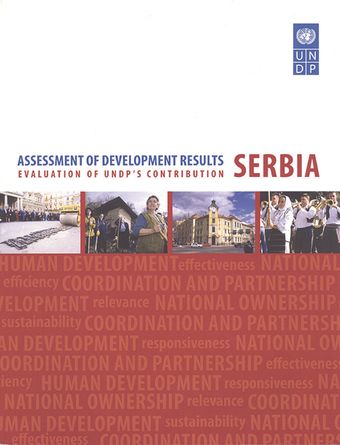UNDP in Yugoslavia

- Author: United Nations Development Programme
- Main Title: Assessment of Development Results - Serbia , pp 22-28
- Publication Date: December 2009
- DOI: https://doi.org/10.18356/9528777f-en
- Language: English
The relationship of Yugoslavia with the United Nations (UN) and its system dates back to 1948 when the Federal Republic of Yugoslavia gained membership in the UN. The break-up of the state in the 1990s led to the establishment of four new independent states: Bosnia and Herzegovina, Croatia, The former Yugoslav Republic of Macedonia, and Slovenia. The SFRY was transformed into the Federal Republic of Yugoslavia, consisting of Serbia, with Kosovo, and Montenegro. The FRY was not permitted to claim the UN seat as a successor state of Yugoslavia and applied for membership, granted 1 November 2000, as a new state. Yugoslavia has been a recipient of UN assistance since the 1950s. The first office of the Expanded Programme of Technical Assistance and Special Fund, the predecessor organization of UNDP, opened in Belgrade in 1952. Between 1966 (when UNDP was established) and 1992, UNDP delivered several country programmes and supported the activities of other UN agencies. In 1992, the UNDP office was closed after international sanctions were imposed on Yugoslavia. During this period, UNDP coordinated programmes for the former Yugoslavia from an office in Vienna. After a small Liaison Office was re-opened in Belgrade in 1996, UNDP’s work focused on crisis response by supporting other UN agencies, including the Office of the UN High Commissioner for Refugees (UNHCR), the UN Children’s Fund (UNICEF), the World Food Programme (WFP) and NGOs working on humanitarian assistance and human rights for victims of conflict, especially refugees and IDPs.
-
From This Site
/content/books/9789210599818c006dcterms_title,dcterms_subject,pub_keyword-contentType:Journal -contentType:Contributor -contentType:Concept -contentType:Institution105



